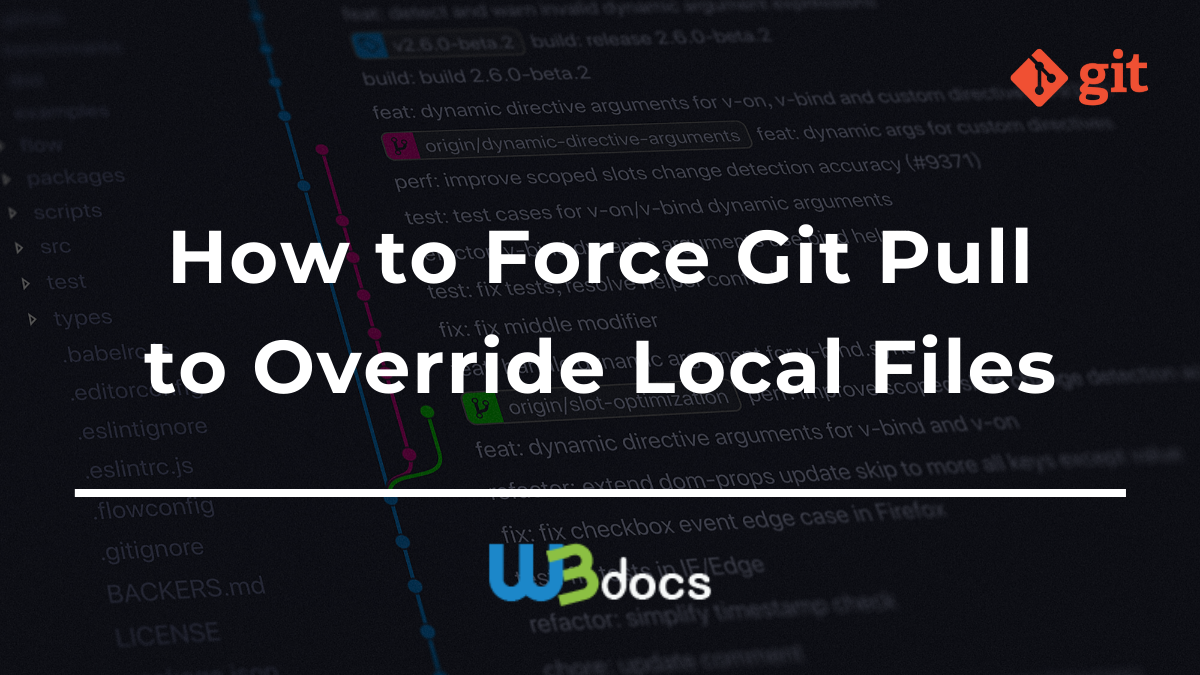
- DOES GIT PULL ORIGIN MASTER OVERWRITE LOCAL CHANGES UPDATE
- DOES GIT PULL ORIGIN MASTER OVERWRITE LOCAL CHANGES CODE
- DOES GIT PULL ORIGIN MASTER OVERWRITE LOCAL CHANGES DOWNLOAD
ff-only: the merge will be resolved only if it is possible to fast-forward. rebase: after fetching the changes from a remote branch, IntelliJ IDEA will rebase local unpushed changes onto the fetched changes. If you need to pull with options, click Modify options and choose from the following: If you specify a different branch, IntelliJ IDEA will remember your choice and display this branch by default in the future. By default, the remote branch tracked by the current local branch is selected. Select the branch from which you want to pull changes into the branch that is currently checked out. If you have several remotes defined for your project, select a remote from the list (by default, it is origin). If you have a multi-repository project, an additional drop-down appears letting you choose the repository.
DOES GIT PULL ORIGIN MASTER OVERWRITE LOCAL CHANGES DOWNLOAD
When you pull, you not only download new data, but also integrate it into your local working copy of the project.įrom the main menu, choose Git | Pull. If you need to get changes into the current branch from another branch instead of its remote tracked branch, use pull.
DOES GIT PULL ORIGIN MASTER OVERWRITE LOCAL CHANGES UPDATE
IntelliJ IDEA will pull changes from the remote branch and will rebase or merge them into the local branch depending on which update method is selected in Settings | Version Control | Git. In the Branches popup or in the Branches pane of the Version Control tool window, select a branch and choose Update from the context menu. This is a convenient shortcut for fetching and subsequently applying changes to the selected branch. Use update if you need to sync a specific branch with its remote tracked branch. Watch this video to get a better view on how fetch operation is performed in IDE. To fetch changes, from the main menu choose Git | Fetch.Īlternatively, open the Branches popup and click the icon in the upper right corner. Since fetch does not affect your local development environment, this is a safe way to get an update of all changes to a remote repository. This new data is not integrated into your local files, and changes are not applied to your code.įetched changes are stored as a remote branch, which gives you a chance to review them before you merge them with your files. When you fetch changes from the upstream, all new data from commits that were made since you last synced with the remote repository is downloaded into your local copy. The Git branches popup indicates whether a branch has incoming commits that have not yet been fetched: Fetch changes You can do this in one of the following ways: fetch changes, pull changes, or update your project. # Delete all files which are being added, so thereįor file in `git diff HEAD.origin/master -name-status | awk '/^A/ '`Įcho "Checking out modified file $file.Sync with a remote Git repository (fetch, pull, update)īefore you can share the results of your work by pushing your changes to the upstream, you need to synchronize with the remote repository to make sure your local copy of the project is up to date.

DOES GIT PULL ORIGIN MASTER OVERWRITE LOCAL CHANGES CODE
Here is the cleanest solution which we are using: # Fetch the newest code The problem with all these solutions is that they are all either too complex or, an even bigger problem, is that they remove all untracked files from the webserver, which we don't want since there are always needed configuration files which are on the server and not in the Git repository.

For example, run the following: git stashĪnd later (after git reset), reapply these uncommitted changes: git stash pop Make sure to stash or commit anything you need. Uncommitted changes, even if staged (with git add), will be lost. Git branch new-branch-to-save-current-commitsĪfter this, all of the old commits will be kept in new-branch-to-save-current-commits. : It's worth noting that it is possible to maintain current local commits by creating a branch from master before resetting: git checkout master The -hard option changes all the files in your working tree to match the files in origin/master. Git reset resets the master branch to what you just fetched.

Git fetch downloads the latest from remote without trying to merge or rebase anything. Jump to the latest commit on origin/master and checkout those files: git reset -hard origin/master Any uncommitted local change to tracked files will be lost, even if staged.īut any local file that's not tracked by Git will not be affected.įirst, update all origin/ refs to latest: git fetch -allīackup your current branch (e.g.


 0 kommentar(er)
0 kommentar(er)
